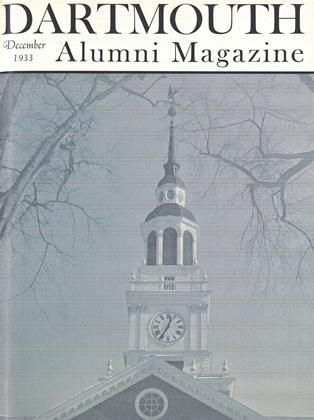THE ATHLETIC COUNCIL is doubtless content to struggle with the problems it has on hand, without being presented with bigger and better ones. Such items of old business as ways and means of financing varsity, freshman, and recreational sports from depleted income; of selecting the personnel of coaching staffs; and providing ice for the hockey team are ever-present problems in these days. Nevertheless, our correspondent whose "Letter to the Editor" appears in this issue suggests another situation that merits the continued attention of the Council until the time arrives when some sort of balance between home and out of town games can be achieved.
To the best of our knowledge every college football team in the land carries the burden of raising enough funds during the fall to pay the way for the year for all other intercollegiate sports and, in most cases, the intra-mural program as well. Only in recent years, in fact only during the season just ended, has Dartmouth been scheduled to play the majority of its games with opponents all of major calibre. This fact together with the prevailing decreases in gate receipts has brought Dartmouth to the rather deplorable situation of playing five of its six major games away from home, and four of these were on successive week-ends. It is true that Harvard, Yale, and Princeton have all signified their willingness to play in Hanover. We are in the uncomfortable position of being forced to decline to extend the hospitality which these good friends stand ready to accept. For the loss in income through such a move would further cripple the Council's athletics-for-all program. It is evident that our opponents would not find an occasional transference of games to Hanover nearly as serious a reduction of receipts in their total income over a period of years.
The faculty has cooperated loyally, in spite of often-expressed principles to the contrary, in allow- ing the football squad to interrupt academic routine and journey on successive Fridays to Philadelphia, Cambridge, New Haven, and Princeton—a house party week-end intervened, and then the boys took to pullmans again for the trek to Chicago. This constant traveling has been no fun for the players. The schedule they have had was difficult enough. They tackled it with fine spirit but that they have now lost all love for pullmans is no surprise. Next season's lineup is much the same. Of five major games Hanover will see only one, Virginia, on October 20. The Harvard, Yale, Cornell, and Princeton contests will all be waged on foreign soil.
It is difficult for alumni to ask the Athletic Council to improve the situation by scheduling at least two major games in Hanover when we know what the financial result would be. "You can't eat your cake and have it too!" But we can urge the Council to look toward 1935 and 1936 and attempt, without further delay, to work toward a happy medium. For we feel that the players and student body, faculty and alumni, townspeople and residents of the North Country—all will hail the day when they can play host to the many, and not the few.
 View Full Issue
View Full Issue
More From This Issue
-
 Article
ArticleHANOVER BROWSING
December 1933 By Rees H. Bowen -
 Class Notes
Class NotesClass of 1910
December 1933 By Harold P. Hinman -
 Class Notes
Class NotesClass of 1930
December 1933 By Albert I. Dickerson -
 Sports
SportsFOLLOWING THE BIG GREEN TEAMS
December 1933 By C. E. Widmayer '30 -
 Class Notes
Class NotesClass of 1929
December 1933 By F. William Andres, Gus Wiedenmayer -
 Article
ArticleENGINEERING, A WAY OF LIFE
December 1933 By Arthur G. Tozzer '02







